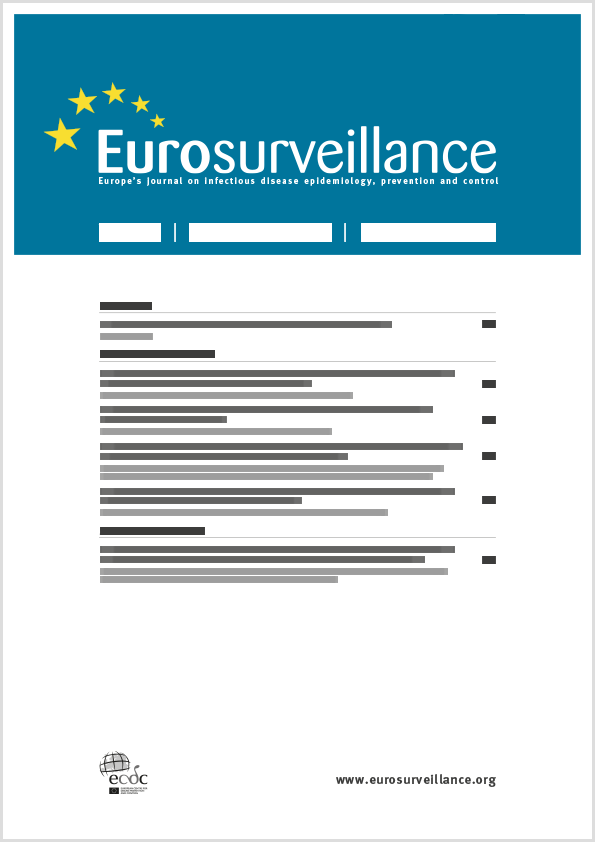- Home
- Eurosurveillance
- Previous Issues
- Volume 18, Issue 10, 07/Mar/2013
Eurosurveillance - Volume 18, Issue 10, 07 March 2013
Volume 18, Issue 10, 2013
- Rapid communications
-
-
-
Detection of a high-endemic focus of Echinococcus multilocularis in red foxes in southern Denmark, January 2013
H L Enemark , M N Al-Sabi , J Knapp , M Staahl and M ChríelMore LessThe Danish surveillance programme for Echinococcus multilocularis was initiated in September 2011, and so far 679 wild carnivores have been examined. In April 2012, one infected fox was detected in Højer near the Danish-German border, and in January 2013 three additional foxes from the same area were found infected. Local prevalence in the area was 31% (four of 13 foxes) which is a new epidemiological situation calling for re-evaluation of the national risk management. .
-
- Top
-
- Surveillance and outbreak reports
-
-
-
Legionnaires’ disease in Europe, 2009-2010
More LessThe surveillance of Legionnaires' disease (LD) in Europe is carried out by the European Legionnaires' Disease Surveillance Network (ELDSNet) and coordinated by the European Centre for Disease Prevention and Control (ECDC). All cases reported in 2009 and 2010 and meeting the European case definition were electronically transmitted to The European Surveillance System (TESSy) database. A total of 5,551 and 6,305 cases were reported by 29 European countries in 2009 and 2010, respectively. The age-standardised rate of all cases was 1.20 per 100,000 inhabitants in 2010, 12% higher than in 2009, which was consistent with the increasing trend observed since 2005. Most of this increase consisted of community-acquired cases reported by France, Germany and the Netherlands with dates of onset in August-September. The exceptionally hot summer of 2010 in some parts of Europe may have played a role in this increase. .
-
- Top
-
- Research articles
-
-
-
Capacities, practices and perceptions of evidence-based public health in Europe
More LessEvidence-based methodologies are used to synthesise systematic high-quality evidence and were first applied in clinical practice. Evidence-based public health, however, is still in its early stages. The European Centre for Disease Prevention and Control sought the insight of European organisations working and providing services in the field of public health on current practices, capacities, perceptions and predictions of evidence-based public health. A survey was sent to 76 organisations. A response rate of 36% was achieved, representing 27 organisations from 16 countries. Systematic reviews were the most commonly offered service, followed by health technology assessments and rapid assessments. Of 25 respondents, 13 believed that evidence-based methodologies were poorly integrated into public health. The main perceived barriers to the further development of evidence-based public health included 'lack of formalised structure or system', 'resource constraints' 'lack of understanding of evidence-based methodologies by policy makers' and 'lack of data'. Nevertheless, 22 of 27 respondents believed that evidence-based methodologies will play an increasingly important role in public health in future. However, several barriers need to be overcome. Consistent frameworks and consensus on best practices were identified as the most pressing requirements. Steps should be taken to address these barriers and facilitate integration and ultimately public health policies. .
-
- Top
-
- News
- Miscellaneous
-
Volumes & issues
-
Volume 30 (2025)
-
Volume 29 (2024)
-
Volume 28 (2023)
-
Volume 27 (2022)
-
Volume 26 (2021)
-
Volume 25 (2020)
-
Volume 24 (2019)
-
Volume 23 (2018)
-
Volume 22 (2017)
-
Volume 21 (2016)
-
Volume 20 (2015)
-
Volume 19 (2014)
-
Volume 18 (2013)
-
Volume 17 (2012)
-
Volume 16 (2011)
-
Volume 15 (2010)
-
Volume 14 (2009)
-
Volume 13 (2008)
-
Volume 12 (2007)
-
Volume 11 (2006)
-
Volume 10 (2005)
-
Volume 9 (2004)
-
Volume 8 (2003)
-
Volume 7 (2002)
-
Volume 6 (2001)
-
Volume 5 (2000)
-
Volume 4 (1999)
-
Volume 3 (1998)
-
Volume 2 (1997)
-
Volume 1 (1996)
-
Volume 0 (1995)
Most Read This Month

-
-
Detection of 2019 novel coronavirus (2019-nCoV) by real-time RT-PCR
Victor M Corman , Olfert Landt , Marco Kaiser , Richard Molenkamp , Adam Meijer , Daniel KW Chu , Tobias Bleicker , Sebastian Brünink , Julia Schneider , Marie Luisa Schmidt , Daphne GJC Mulders , Bart L Haagmans , Bas van der Veer , Sharon van den Brink , Lisa Wijsman , Gabriel Goderski , Jean-Louis Romette , Joanna Ellis , Maria Zambon , Malik Peiris , Herman Goossens , Chantal Reusken , Marion PG Koopmans and Christian Drosten
-
- More Less


